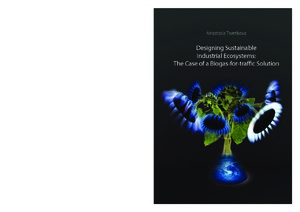Designing sustainable industrial ecosystems : the case of a biogas-for-traffic solution
Tsvetkova, Anastasia (2014-12-12)
Tsvetkova, Anastasia
Åbo Akademi - Åbo Akademi University
12.12.2014
Julkaisu on tekijänoikeussäännösten alainen. Teosta voi lukea ja tulostaa henkilökohtaista käyttöä varten. Käyttö kaupallisiin tarkoituksiin on kielletty.
Julkaisun pysyvä osoite on
https://urn.fi/URN:NBN:fi-fe2014112446522
https://urn.fi/URN:NBN:fi-fe2014112446522
Tiivistelmä
This thesis focuses on the development of sustainable industrial architectures for bioenergy based on the metaphors of industrial symbiosis and industrial ecosystems, which imply exchange of material and energy side-flows of various industries in order to improve sustainability of those industries on a system level. The studies on industrial symbiosis have been criticised for staying at the level of incremental changes by striving for cycling waste and by-flows of the industries ‘as is’ and leaving the underlying industry structures intact. Moreover, there has been articulated the need for interdisciplinary research on industrial ecosystems as well as the need to extend the management and business perspectives on industrial ecology. This thesis addresses this call by applying a business ecosystem and business model perspective on industrial symbiosis in order to produce knowledge on how industrial ecosystems can be developed that are sustainable environmentally and economically.
A case of biogas business is explored and described in four research papers and an extended summary that form this thesis. Since the aim of the research was to produce a normative model for developing sustainable industrial ecosystems, the methodology applied in this research can be characterised as constructive and collaborative. A constructive research mode was required in order to expand the historical knowledge on industrial symbiosis development and business ecosystem development into the knowledge of what should be done, which is crucial for sustainability and the social change it requires. A collaborative research mode was employed through participating in a series of projects devoted to the development of a biogas-for-traffic industrial ecosystem.
The results of the study showed that the development of material flow interconnections within industrial symbiosis is inseparable from larger business ecosystem restructuring. This included a shift in the logic of the biogas and traffic fuel industry and a subsequent development of a business ecosystem that would entail the principles of industrial symbiosis and localised energy production and consumption. Since a company perspective has been taken in this thesis, the role of an ecosystem integrator appeared as a crucial means to achieve the required industry restructuring. This, in turn, required the development of a modular and boundary-spanning business model that had a strong focus on establishing collaboration among ecosystem stakeholders and development of multiple local industrial ecosystems as part of business growth. As a result, the designed business model of the ecosystem integrator acquired the necessary flexibility in order to adjust to local conditions, which is crucial for establishing industrial symbiosis.
This thesis presents a normative model for the development of a business model required for creating sustainable industrial ecosystems, which contributes to approaches at the policy-makers’ level, proposed earlier. Therefore, this study addresses the call for more research on the business level of industrial ecosystem formation and the implications for the business models of the involved actors. Moreover, the thesis increases the understanding of system innovation and innovation in business ecosystems by explicating how business model innovation can be the trigger for achieving more sustainable industry structures, such as those relying on industrial symbiosis.
A case of biogas business is explored and described in four research papers and an extended summary that form this thesis. Since the aim of the research was to produce a normative model for developing sustainable industrial ecosystems, the methodology applied in this research can be characterised as constructive and collaborative. A constructive research mode was required in order to expand the historical knowledge on industrial symbiosis development and business ecosystem development into the knowledge of what should be done, which is crucial for sustainability and the social change it requires. A collaborative research mode was employed through participating in a series of projects devoted to the development of a biogas-for-traffic industrial ecosystem.
The results of the study showed that the development of material flow interconnections within industrial symbiosis is inseparable from larger business ecosystem restructuring. This included a shift in the logic of the biogas and traffic fuel industry and a subsequent development of a business ecosystem that would entail the principles of industrial symbiosis and localised energy production and consumption. Since a company perspective has been taken in this thesis, the role of an ecosystem integrator appeared as a crucial means to achieve the required industry restructuring. This, in turn, required the development of a modular and boundary-spanning business model that had a strong focus on establishing collaboration among ecosystem stakeholders and development of multiple local industrial ecosystems as part of business growth. As a result, the designed business model of the ecosystem integrator acquired the necessary flexibility in order to adjust to local conditions, which is crucial for establishing industrial symbiosis.
This thesis presents a normative model for the development of a business model required for creating sustainable industrial ecosystems, which contributes to approaches at the policy-makers’ level, proposed earlier. Therefore, this study addresses the call for more research on the business level of industrial ecosystem formation and the implications for the business models of the involved actors. Moreover, the thesis increases the understanding of system innovation and innovation in business ecosystems by explicating how business model innovation can be the trigger for achieving more sustainable industry structures, such as those relying on industrial symbiosis.
Kokoelmat
- 512 Liiketaloustiede [57]
